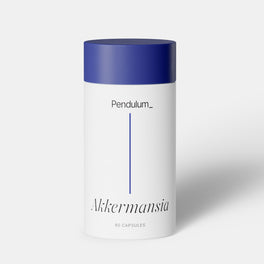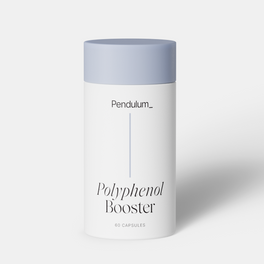Looks like your
cart is empty

Metabolic Daily
Improve metabolism

Akkermansia
Improves gut health

Polyphenol Booster
Increase antioxidants to protect cells
Stay in touch about special discounts, nutrition tips and additional education.
Looks like your
cart is empty

Improve metabolism

Improves gut health

Increase antioxidants to protect cells
In our fast-paced world, where stress and anxiety seem to be constant companions, finding holistic approaches to wellness has become increasingly vital. One such practice that’s gained global recognition for its myriad benefits is meditation. Beyond its well-documented effects on mental health, meditation is now being acknowledged for its potential to positively impact your physical well-being, particularly in the realm of gut health. Yep, that’s right–saying om is good for your gut microbiome.
So how does it work? Well, the gut, often referred to as the "second brain," plays a pivotal role in your overall health, and is intricately connected to your brain. This gut-brain axis is a bidirectional communication system between the central nervous system and the gastrointestinal tract, involving complex networks of neurons, hormones, and the gut microbiota. This intricate relationship means that our mental state can significantly influence our digestive health, and vice versa.
If you’ve ever had a nervous tummy or GI issues when faced with intense stress, then you know that gut feeling is more than an idiom. Numerous studies have explored the connection between stress and gastrointestinal issues. Chronic stress can lead to inflammation in the gut, affecting the balance of the gut microbiota and increasing susceptibility to digestive disorders. Meditation, with its focus on relaxation and mindfulness, has been shown to reduce stress levels and alleviate the impact of stress on the gut.
Of course, one of the best ways to alleviate stress is with meditation. New research suggests that engaging in regular meditation over an extended period might have a positive impact on the human gut, enhancing the immune system and decreasing the likelihood of anxiety, depression, and heart disease. A study involving Buddhist monks revealed that intensive meditation may contribute to the regulation of the gut microbiome, reducing the risk of both physical and mental health issues. Other studies suggest that mindfulness meditation can lead to changes in the expression of genes associated with inflammation, suggesting a potential mechanism through which meditation may positively influence gut health.
If you’re not ready to practice full-on transcendental meditation, there are other options. Many meditation techniques incorporate mind-body practices that can positively impact the gut-brain axis. Yoga, for example, combines physical postures, breath control, and meditation to promote overall health, including digestive wellness. The slow, controlled movements of yoga can stimulate the parasympathetic nervous system, reducing stress and supporting better digestion.
In fact, the state of meditation encourages relaxation and mindfulness, which may positively impact digestive function. Mindful eating, a practice closely related to meditation, involves paying full attention to the sensory experience of eating, including taste, texture, and smell. This mindful approach to eating can enhance digestion by promoting proper chewing and optimizing nutrient absorption.
As we delve deeper into the connection between the mind and the gut, the role of meditation in fostering digestive health becomes increasingly evident. From reducing stress-related inflammation to promoting a balanced gut microbiome and enhancing digestive function, meditation offers a holistic approach to well-being. Incorporating mindfulness practices into your daily life may not only nourish your mind but heal your gut. From inner peace to gut release, meditation stands out as a powerful tool for cultivating a healthier and more balanced life from within.